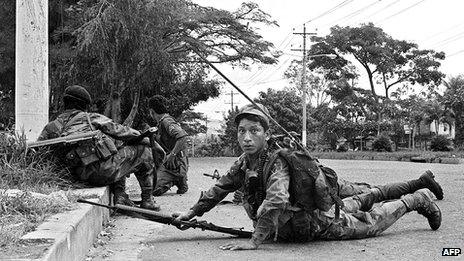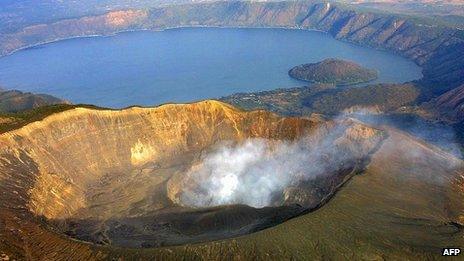El Salvador profile - Timeline
- Published

Left-wing rebels and government forces (pictured) fought in a 12-year civil between 1979-92
A chronology of key events
1524 - Spanish adventurer Pedro de Alvarado conquers El Salvador.
1540 - Indigenous resistance finally crushed and El Salvador becomes a Spanish colony.
1821 - El Salvador gains independence from Spain. Conflict ensues over territory's incorporation into Mexican empire under Creole general Agustin de Iturbide.
1823 - El Salvador becomes part of the United Provinces of Central America, which also includes Costa Rica, Guatemala, Honduras and Nicaragua.
Independence
1840 - El Salvador becomes fully independent following the dissolution of the United Provinces of Central America.
1859-63 - President Gerardo Barrios introduces coffee growing.
1932 - Some 30,000 people are killed during the suppression of a peasant uprising led by Agustine Farabundo Marti.
Civil war
1961 - Right-wing National Conciliation Party (PCN) comes to power after a military coup.
1969 - El Salvador attacks and fights a brief war with Honduras following the eviction of thousands of Salvadoran illegal immigrants from Honduras.
1977 - Guerrilla activities by the left-wing Farabundo Marti National Liberation Front (FMLN) intensify amid reports of increased human rights violations by government troops and death squads; General Carlos Romero elected president.
1979-81 - Around 30,000 people are killed by army-backed right-wing death squads.
1979 - General Romero ousted in coup by reformist officers who install a military-civilian junta, but this fails to curb army-backed political violence.
1980 - Archbishop of San Salvador and human rights campaigner Oscar Romero assassinated; Jose Napoleon Duarte becomes first civilian president since 1931.
1981 - France and Mexico recognise the FMLN as legitimate political force; US continues to assist El Salvadoran government whose army continues to back right-wing death squads.
1982 - Extreme right-wing National Republican Alliance (Arena) wins parliamentary elections marked by violence.
1984 - Duarte wins presidential election.
1986 - Duarte begins quest for negotiated settlement with FMLN.
1989 - FMLN attacks intensify; another Arena candidate, Alfredo Cristiani, voted president in elections widely believed to have been rigged.
Peace and natural disasters
1991 - FMLN recognised as political party; government and FMLN sign UN-sponsored peace accord.
1993 - Government declares amnesty for those implicated by UN-sponsored commission in human rights atrocities.
1994 - Arena candidate Armando Calderon Sol elected president.
1997 - FMLN makes progress in parliamentary elections; leftist Hector Silva elected mayor of San Salvador.
1999 - Arena candidate Francisco Flores beats former guerrilla Facundo Guardado in presidential election.
2001 January, February - Massive earthquakes kill 1,200 people and render another one million homeless.
2002 July - US court holds two retired, US-based Salvadoran army generals responsible for civil war atrocities, orders them to compensate victims who brought case.
2003 August - 360 Salvadoran troops despatched to Iraq.
2003 December - El Salvador - along with Honduras, Nicaragua, Guatemala - agrees on a free-trade agreement with the US. The government ratifies the pact in December 2004.
Saca presidency
2004 March - Arena candidate Tony Saca wins presidential elections.
2005 March - OAS human rights court votes to re-open an investigation into the 1981 massacre of hundreds of peasant farmers in the village of El Mozote, regarded as one of the worst atrocities of the civil war.
2005 October - Thousands flee as the Ilamatepec volcano, also known as Santa Ana, erupts. Days later scores of people are killed as Tropical Storm Stan sweeps through.
2006 March - El Salvador is the first Central American country to implement a regional free trade agreement with the US.
2006 April - El Salvador and neighbouring Honduras inaugurate their newly-defined border. The countries fought over the disputed frontier in 1969.
2007 January - 21 inmates are killed in a riot at a maximum-security prison west of the capital.
2007 February - Three members of the governing Arena party are murdered in Guatemala. There are suspicions that an organised crime syndicate is behind the killings.

El Salvador's position on the Pacific "Ring of Fire" makes it prone to volcanic eruptions and earthquakes
2008 January - More than 400 judges hold a street protest over corruption allegations made against four of their colleagues.
2009 January - Former FMLN rebel movement emerges as largest party in parliamentary elections, although short of a majority. Seen as preparation for presidential election in March.
2009 February - Ruling party Arena wins largest number of places in local elections despite polls favouring the opposition FMLN.
Funes elected
2009 March - Former Marxist rebel Mauricio Funes of the FMLN party wins presidential elections, marking the first time in two decades that a leftist president has been voted in.
2009 June - Mauricio Funes sworn in as president. Restores diplomatic relations with Cuba.
2009 November - More than 140 people are killed and thousands left homeless in mudslides and floods.
2010 June - Fourteen people killed in two attacks by suspected gang members on public buses in capital, San Salvador, on the same day.
2011 September - US adds El Salvador and Belize to its list of countries considered major producers or transit routes for illegal drugs.
2011 October - Torrential rains cause flooding across Central America, killing several people in El Salvador.
2011 December - Government apologises for civil war massacre of more than 1,000 poeple in the town of El Mozote.
2012 March - Funes government suffers setback in parliamentary polls which give the right-wing a narrow victory.
2012 December - Human Rights Court for the Americas finds El Salvador guilty over the civil war massacre at El Mozote in 1981.
2013 April - A year-long truce between street gangs has saved the lives of thousands, the government says.
2014 March - Vice-President Sanchez Ceren scores narrow win over conservative candidate Norman Quijano in presidential election. He takes office in June as the first former left-wing rebel to become president.
2014 June - The US boosts aid and speeds up deportations to cope with the growing number of migrants from Central America. El Salvador, Honduras and Guatemala are to receive millions of dollars to combat gang violence and help citizens repatriated from the US.
2014 September - Former president Francisco Flores is placed under arrest after he hands himself in to the authorities over charges of misappropriating funds from Taiwan during his 1999-2004 term in office. He denies the charges, which he says are politically motivated.
2015 May - Murdered Archbishop Oscar Romero is beatified, after Pope Francis approved his status as martyr in January.
2017 January - Police say the country has gone 24 hours without any murders - a rare occurrence in a nation plagued by gang warfare.